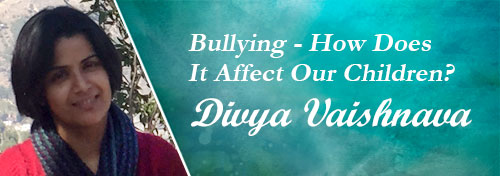Bullying- How Does It Affect Our Children?
Dr Dan Olweus, a research professor of Psychology has worked on the issue of bullying for more than thirty five years. According to Dr Oleweus,”A person is bullied when he or she is exposed, repeatedly and over time, to negative actions on the part of one or more other persons, and he or she has difficulty defending himself or herself.”
Bullying is an aggressive behavior that is intentional and that involves an imbalance of power or strength. It is mostly repeated over time and gets manifested in various forms –
- Physical bullying- hitting, punching
- Verbal bullying- teasing or name calling
- Non verbal or Emotional bullying- using gestures or social exclusion
- Cyber bullying- sending insulting texts or mails
Making fun of a peer for not wearing branded clothes, for not having the latest or more expensive toys, for not being able to speak fluently in English, for having an address which can’t be termed cool or posh, for standing up to something they believe in etc. are some more instances of bullying. The list grows at an alarming rate and I often come across adults who close their eyes to their children’s aggression or bullying tendencies by terming it their innocent behavior. Or the classic ‘boys will be boys’ and ‘girls are usually gentle’. I would like to put a disclaimer here by saying girls can bully too and they do that all the time.
Do parents understand what constitutes bullying tendencies in children? Bullying is very common in schools and children often end up taking sides of the bully in order to avoid being at the receiving end of the taunts and teasing that are a part of what bullying constitutes. In some cases, the bully and the bullied both find themselves at the fringe of school social life. Who is responsible for such behavior in children? As adults the responsibility lies with parents, teachers and caregivers to notice any changes in the children and take immediate action to resolve the issues. Most of the parents remain in denial and refuse to acknowledge that their child is having problems – either of being a bully or getting bullied. Teachers don’t acknowledge it as they sometimes view it as their failure. The whole school loses when bullying goes unabated and the students feel unsafe as they know that they can be the victims too. The school is a place where children come in search of acceptance, love and friendships. Learning is not the only purpose of any child attending a school- so it’s a failure for any school not to acknowledge the problem of bullying and take appropriate steps to handle it.
How can parents be supportive?
Parents need to identify the signs when a child shows uncharacteristic changes in her behavior and is throwing unusual temper tantrums, looking forlorn and losing interest in the favorite daily routine. Parents passing it off as just a phase can sometimes lead to very serious problems and may later manifest as depression. Parents often confuse these changes as having the ‘blues’ or a bad mood swings which is nothing out of ordinary. The key to handling such issues is listening to the child and addressing her concerns. It could take any amount of time ranging from few minutes to days before a child will open up and share what’s troubling her. Patience is the key here and respecting the child no matter what she has shared is very important. A parent has to be nonjudgmental and create an environment where child can freely express her thoughts without any interruption.
Other reasons for sudden transformation in a child’s behavior and increase in aggressive tendencies could be due to major changes in her life- change of school, day care, a new nanny, new city or a parent’s new job profile which are keeping the parent away from home for long hours.
I find that the most devastating thing that happens to a child with bullying tendencies is loss of friendships; the child is not able to develop close long lasting relationships as that requires nurturing and investing in terms of time, effort and emotions. Those childhood deep connections which can be built only over sharing a small amount of pocket money, giving away your favorite toy or letting the friends read the most cherished set of story books or bringing home cooked savories for them. How will a child ever develop such connections if she is not included in free play with her peers? But not addressing the issue will not make it go away.
Recently in Ohio, a 15-year-old girl who was bullied by classmates for years has killed herself after naming her tormenters in a suicide note and telling them: ‘Thanks for all the pain.’ Her classmates and friends have confirmed that she was the target of name calling and teasing. In this case, the girl was also feeling unloved at home and problems at school only made it worse. There are many studies that suggest that a loving family and supportive friends help adolescents cope up easily with such issues. If this girl was confident about sharing her issues with her family, about her feelings of loneliness and being unloved, she might have been able to develop some strategies to deal with her bullies. Now, we will never know, she is gone forever.
In India, we had a tragic case of an 11 year old girl who was traumatized after she was locked for hours in the toilet of the school by a group of senior girls in her school. Oindrella died after she was sent to a local hospital for treatment. That was two different countries, different cultures, yet the same problem. In first case, a child, who was supposed to be feeling protected and loved by her family, friends and school decided to end her life because she didn’t want to live. In second case, a group of young girls who are supposed to be busy playing, giggling at silly jokes, sharing their teen issues become so cruel that they cause the death of another girl. It may have been a combination of factors in both the cases, but the fact remains that bullying remains one of the reasons.
The solution lies with all of us and as a community we need to work together to tackle this issue.
In the next article, I will be talking about bullying in primary school children with the help of few case studies and how we can help our children.
Divya is a mother of two children 9 and 6. She is a social worker and is keen to research on various social issues. She has been associated with various causes and likes to work with and around children. Her love for books, music, chai and rains is widely known in her circle of friends. She is also an occasional story teller to her children and their friends.

